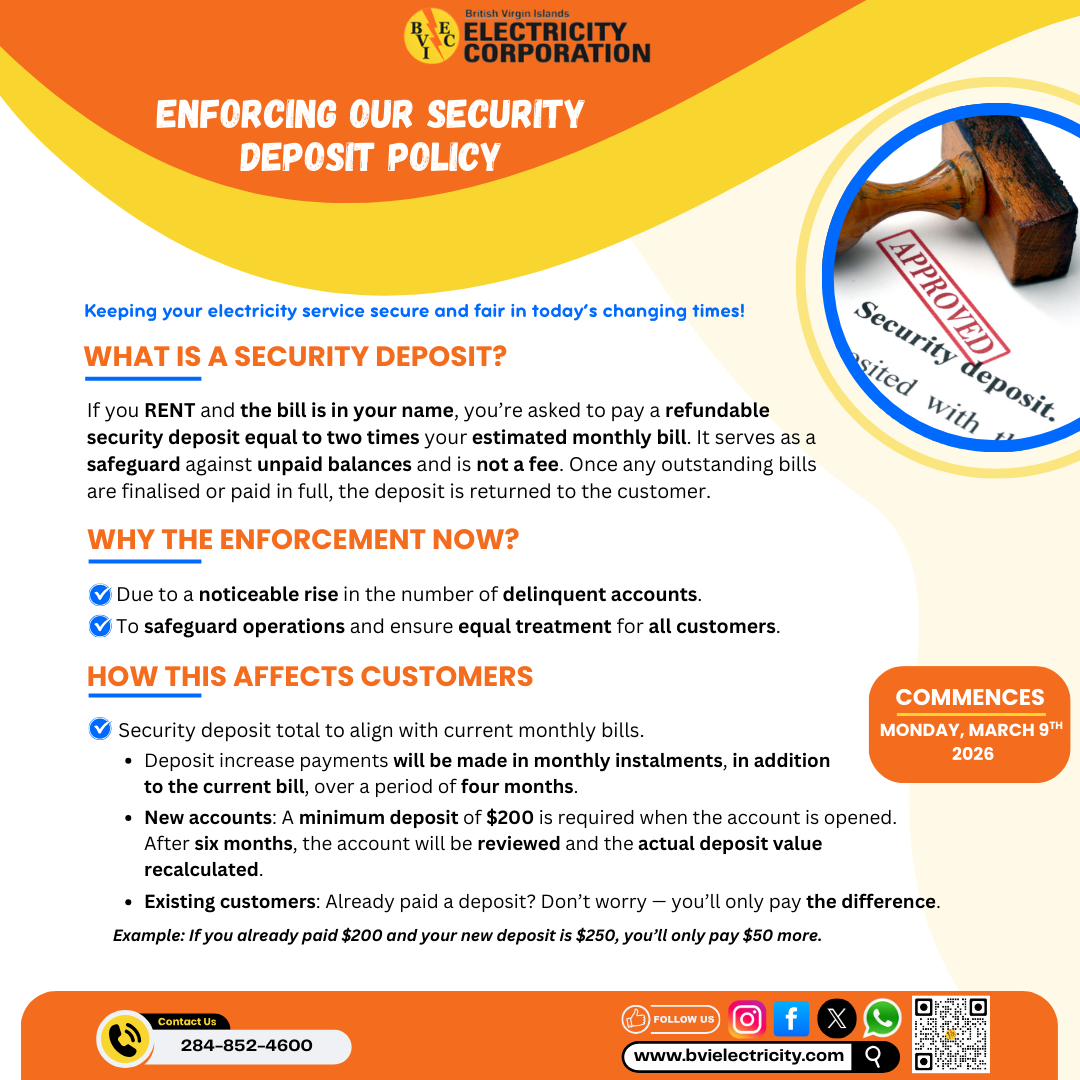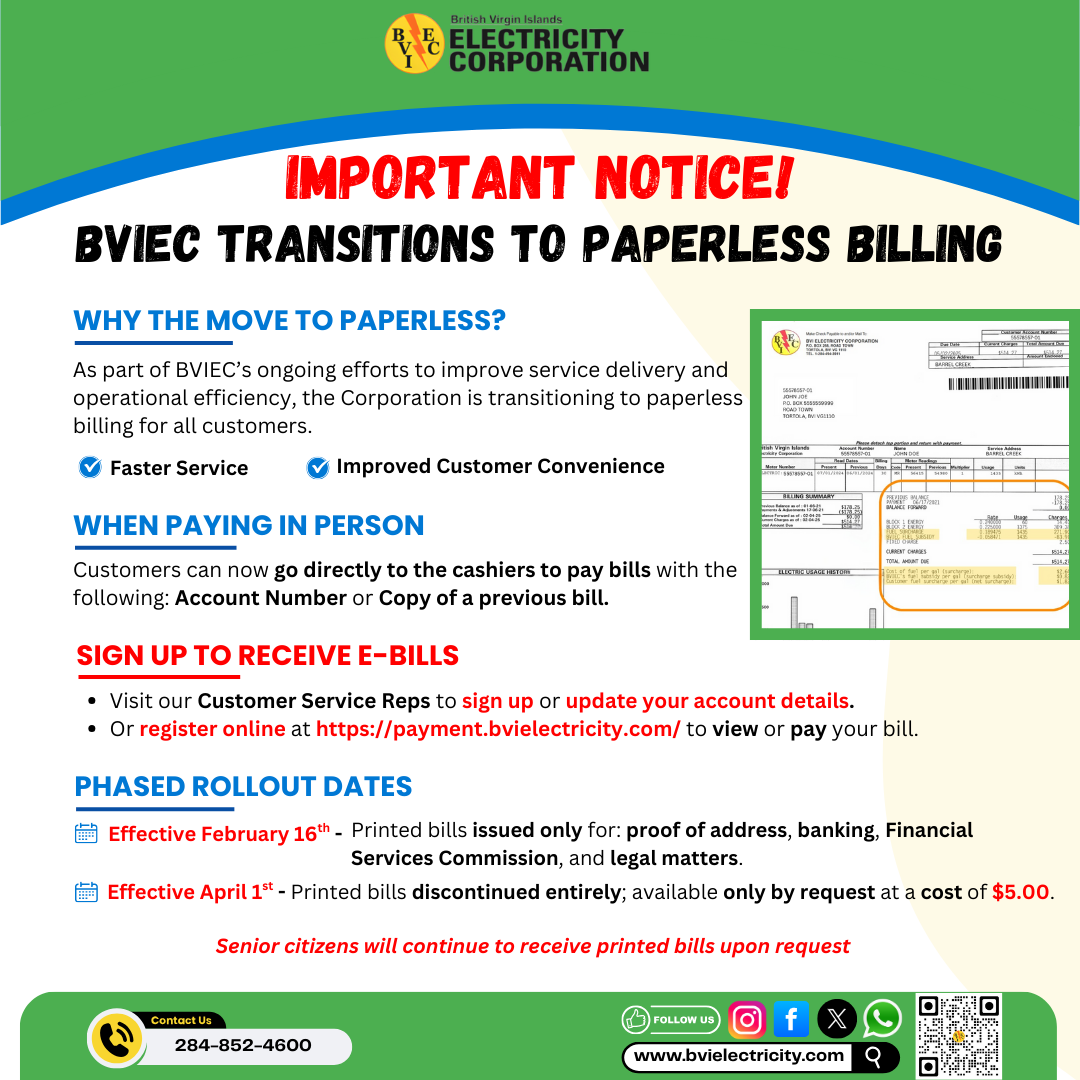Gov’t Wants To Open Up Electricity Sector
The government of the Virgin Islands is looking at improving supply-side competition, by allowing more bids for licenses for Independent Power Producers (IPP). Further, as this area is opened up, the BVI Electricity Corporation (BVIEC) will also be policed by an independent energy regulator for the power sector.
According to the 15-page Energy Policy which was made public by Hon. Mark Vanterpool, Minister of Communications and Works, and obtained by BVI Platinum News, the legal framework for introducing supply-side competition is already in place.
However, IPP for renewable energy projects can now deliver electricity according to a Power Purchase Agreement (PPA) with BVIEC. It states that providing transparency and certainty to the procurement process, BVI will be able to attract more bids and competition for its solicitations.
Some of the actions the policy proposes that government should implement are to develop IPP bid ranking procedures for IPPs to incorporate adjustments for more rekindle resources , lower environmental footprint , more efficient use of existing assets and higher local content. Further, coordinate adoption of renewables with distribution and transmission infrastructure to ensure that infrastructure costs are allocated fairly to all parties.
“Revisit fuel clauses in the tariff to include BVI’s full portfolio of resources. To ensure the supply-side competition is sustainable, BVIEC must be allowed to recoup the costs for procuring alternate resources.”
Currently, to allow BVIEC to cover all costs of generation, the base rate is supplemented by a fuel clause with a monthly adjustment follows the actual fuel price. This fuel adjustment is specifically limited to diesel fuel only.
“If BVIEC’s fuel mix contains energy sources other than diesel fuel, such as, renewable energy sources, the costs of these would not currently be captured in the fuel clause. The current fuel clause mechanism needs to be updated to allow non-diesel sources in the energy mix and assure financial neutrality for BVIEC,” the policy states.
BVIEC is a publicly-owned utility, which manages the territory’s generation, transmission, and distribution, and is regulated under the government’s Ministry of Communications and Works. The current regulatory and physical infrastructure was developed based on a simple model when BVI had less than 2000 customers.
The policy states that as the population and demand grew, as renewable generation increases, and as new market entrants emerge in the power sector, the goal of infrastructure strategies is to develop a physical and regulatory infrastructure that can accommodate the next generation of technologies and policies.
To this end, the policy states that strategies include establishing an independent regulator, modernizing the grid through smart grid initiatives, and developing a comprehensive transportation plan.
“In general, infrastructure strategies require high upfront costs but have the potential to decrease costs in the long term.”
According to the policy, regulation of the power sector by an independent regulator within a legally established regulatory framework has been introduced in many countries.
The regulator (considered as a ‘surrogate’ for competition), will be in charge of tariff determinations; regulation of the quality of supply as well as the quality of customer service; reviewing and approving the utility’s strategic (typically 5-year) or integrated resource plans; reviewing applications of IPPs as received and reviewed by the utility; and advising the Minister on granting licenses to IPPs, and other functions.
In general, a knowledgeable and independent regulatory body can incentivize an electric utility to go the extra mile toward higher efficiency, lower tariffs, higher reliability, and higher quality of service. An independent energy regulator better ensures utility balancing and contracting for IPPs and equal access to providers.
It states that since there are costs involved with establishing a regulatory body, the government’s assessment should weigh the cost against its advantages .
Reference
Delta suffers second defeat in battle with BVIEC. (2017, May 15). Retrieved from BVIDaily News: http://www.bvidailynews.com/news.php?articleId=25766
Archive
- February 2026
- January 2026
- December 2025
- November 2025
- October 2025
- September 2025
- August 2025
- July 2025
- June 2025
- May 2025
- April 2025
- March 2025
- January 2025
- December 2024
- July 2024
- February 2024
- June 2023
- December 2022
- August 2022
- January 2022
- November 2021
- October 2021
- May 2021
- January 2021
- December 2020
- June 2020
- March 2020
- October 2019
- August 2019
- November 2018
- July 2018
- August 2017
- May 2017
- January 2017
- October 2016
- September 2016
- August 2016
- March 2015
- December 2014





